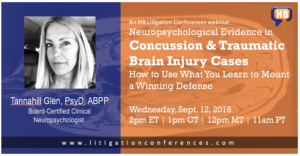How Is “Neuropsychological Evidence” Different From “Neuropsychological Testing?” A Post For Attorneys Litigating Brain Injury Claims
As you can see from the flyer below, I’m presenting a webinar in a couple of weeks on this very topic. For 20 years, I was a testifying expert in medicolegal cases with brain injury or neuropsychiatric claims. And two decades’ experience in Florida’s feisty and busy judicial environment has given me a unique perspective on how neuropsychology works in the litigation setting.

And here’s my big takeaway: neuropsychology has enormous relevance and utility in the court setting, which extends far beyond the neuropsychological evaluation.
Neuropsychological “testing” simply refers to the evaluation performed by a treating or expert clinician. Attorneys may choose to call the clinician as a witness to convey their findings as one piece of evidence in the case.
Neuropsychological “evidence” is a broader concept that encompasses the scientific literature, clinical practice guidelines, all medical records, historical psychosocial, academic and vocational history, surveillance, and all opinions of both sides’ treating and expert doctors in various specialities, like Neurology, Psychiatry and more–and all of this in the context of litigation specifics: the particular attorney teams, Courts, and prior rulings.
Here is a perfect example: I was retained by the Defense as an expert on a recent case in which neuropsychological evaluation was previously performed by a treating doctor. From the attorney’s perspective, the report was rather concerning, a potential liability. But the same report looked much different from my own perspective as a clinician. In fact, I felt it would be easy to depose this doctor in a way that highlighted and expanded on the issues favorable to the attorney’s case, and neutralize opinion that initially sounded ominous.
Hiring a testifying expert for a Battle of the Doctors can be extraordinarily expensive and frustrating in the more aggressive litigation, so why not just use the opposing side’s own star witness to convey your evidence?
I was able to prepare the attorneys for deposition of this clinician, showing them exactly how to elicit the opinions most critical to their case, using precise terminology and follow-through in questions that would ensure the witness understood the question and gave a clear response stating the extremely favorable evidence. (And if the witness is more reluctant to acknowledge established science or methodology, there are ways to deal with that, as well!)
Although attorneys sometimes prefer to save such important testimony for trial, it was a good thing the strategic deposition was done as planned: the doctor was not available for trial two years later! But the testimony was still admissable, and it made a huge impact with the jury.
Another example: It’s shockingly common for doctors, even experts, in brain injury litigation to speak of traumatic brain injury as a unitary phenomenon. In fact, there are very clear published criteria for evaluating and establishing severity of injury: concussion/mild, complicated mild, moderate, or severe traumatic brain injury (TBI).
Consider this: would an oncologist give the same tests, treatment and prognosis to the patient with early stage treatable prostate cancer, and the patient with late stage metastatic brain tumor? Of course not!
Likewise, the evaluation, treatment, and expectations for recovery are different across the spectrum of traumatic brain injury severity.
But you will still encounter opposing experts happy to ascribe symptoms of catastrophic brain injury to a Plaintiff with concussion. I’ve had numerous recent cases in which strategic depositions were used to force witnesses to “choose a lane and stay in it.” This avoids the problem of a witness taking the stand and going rogue by expounding on severe TBI–in a case which has no relevance to severe TBI.
There are endless other tactics commonly used by attorneys in brain injury litigation, for instance, use of an out-of-date, out-of-context document to intimidate doctor witnesses into concessions on the stand, or misapplication of obscure diagnostic criteria to confuse juries and witnesses. It is critical to have neuropsychological consultation in your brain injury litigation to identify these events and respond rapidly and effectively.
But neuropsychological consultation is not at all just about the other side’s tactics and witnesses! For example, I also work with attorneys to ensure language is precise and understandable for the trier of fact, on complex topics like performance validity, malingering, somatization and others. I recently helped an attorney conceptualize a major confounding issue in his TBI defense case: the attorney viewed the evidence as extremely damaging. But with education and reformulation of the issue through neuropsychological consultation, the attorney was able to better understand the evidence, which actually became supportive of his client’s position.
In summary, using neuropsychology in these novel ways confers a courtroom advantage, helping you anticipate and respond to tactics, elicit evidence critical to your case, and identify and neutralize evidence vulnerable to challenge.


